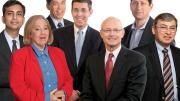Does the United States face insoluble economic challenges? In the aftermath of the 2008 financial crisis and subsequent recession, growth has been sluggish—with unemployment devastating far too many Americans. Yet the real problem, obscured by this acute, cyclical downturn, may be a long-term erosion of competitiveness in a more challenging global economic era.
For a third of a century after World War II, U.S. economic prowess was unquestioned. But as other nations prospered, America’s status came to seem less certain. That changing relative position attracted the interest of Harvard Business School (HBS) scholars. The school’s U.S. Competitiveness Project (www.hbs.edu/competitiveness), launched last spring, draws together expertise from colleagues and from other institutions, under the leadership of two members of HBS’s strategy unit: Lawrence University Professor Michael E. Porter, the leading scholar of competitive strategy (identifying the elements that can make an enterprise distinctive and successful, sorting out the defining characteristics of different industries, advising nations about their economic opportunities); and Rauner professor of business administration Jan W. Rivkin. Their collective aim is devising strategies for a robust U.S. economic future.
The work proceeds from an encompassing definition of the purpose of business and economic activity: The United States is a competitive location to the extent that companies operating in the U.S. are able to compete successfully in the global economy while supporting high and rising living standards for the average American. A competitive location produces prosperity for both companies and citizens.
The project’s research attempts to address comprehensively the country’s economic strengths (innovation and entrepreneurship, for instance, and research universities) and shortcomings (deteriorating worker skills, complex tax and regulatory systems, and fractious federal policymaking). A survey of HBS alumni added weight to those concerns—particularly about political paralysis and the relative attractiveness of other countries for future investment. A special issue of Harvard Business Review presented a baker’s dozen of in-depth analyses of major issues by project participants, from reforming finance to investing in green energy to righting the federal fisc (in part by raising revenue with carbon and value-added taxes). Among the noteworthy themes emerging from the work:
- The importance of the business “ecosystem.” Individual firms’ decisions depend on the network of resources (diverse suppliers, skilled workers, efficient infrastructure) around them. Focusing on a single enterprise may be insufficient to assure success—and may even undercut it, if a firm’s short-term, self-interested decisions starve the “commons,” compromising future prosperity.
- Acting locally. Those attributes for economic success, and the policy context for a firm’s operation, are effective and can be affected locally, where the availability of workers, training, academic and educational expertise, and other factors determine what companies and industries can actually do. A region’s business, labor, education, and government leaders can do much to enhance competitiveness without awaiting federal action (although much depends on what happens in Washington, too).
- Improve, not move. There is ample room for better practices within businesses’ control. One is making decisions about where to locate (or to outsource) operations in a more sophisticated, nuanced way. Another is investing in apprenticeships and other skills programs for workers. A third is rethinking stock-based compensation systems, to rein in powerful incentives toward short-term thinking and excessive risk-taking by business managers and institutional investors alike.
The competitiveness agenda is daunting. Tweaking this regulation, refining that tax credit—these are not even half-measures. Yet the broad analyses and recommendations have the ring of reality, and suggest common gains for companies, citizens, and their communities. On balance, Porter, Rivkin, and their peers remain encouraged about America’s prospects, based on its enduring strengths and proven economic adaptability. McLean professor of business administration David A. Moss even finds in historic ideological divisions and partisanship the seeds for future compromises and progress that might ease business leaders’ greatest current fear about the country’s economic future.
Harvard Magazine recently met with several of the competitiveness project’s principals, from diverse business disciplines, to discuss their research at length. Edited versions of those conversations follow. ~The Editors
Next: The Strategic Context
“We should have been worried before the Great Recession”
Michael E. Porter, Lawrence University Professor, and Jan W. Rivkin, Rauner professor of business administration and head of HBS’s strategy unit















